Not sure which CFA approved calculator to use? If you’re still on the fence about Texas Instrument’s BA II Plus vs HP 12C, you’ve come to the right place.
In this CFA calculator guide – which also applies to the FRM and CAIA exams by the way – we discuss the pros and cons of each model and what we think is the best calculator for CFA Level 1 and beyond.
Remember that CFA exams have a strict calculator policy. You would not be allowed to use your calculator in the exams if you don’t have the exact approved model to hand.
Only 2 calculator models (and their variations) are allowed for CFA exams:
- Texas Instruments BA II Plus (including BA II Plus Professional), and
- Hewlett-Packard 12C (including the HP 12C Platinum, 12C Platinum 25th anniversary edition, 12C 30th anniversary edition, and HP 12C Prestige).
I wouldn’t call this the CFA Program version of the smartphone wars, but sometimes discussions can get a little heated on which calculator for CFA exams is ‘better’.
Read on for a more detailed comparison on all models!
TI BA II Plus: A popular & value-for-money workhorse
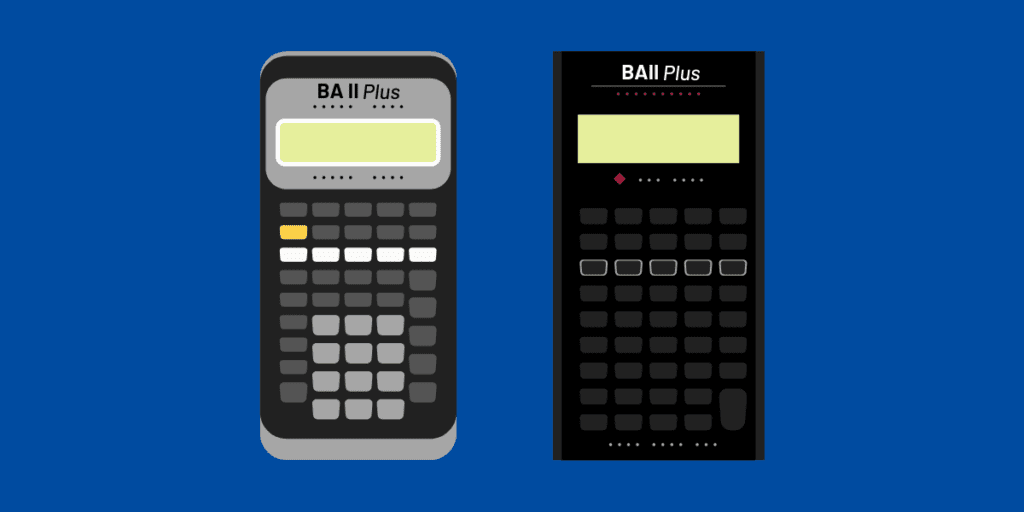
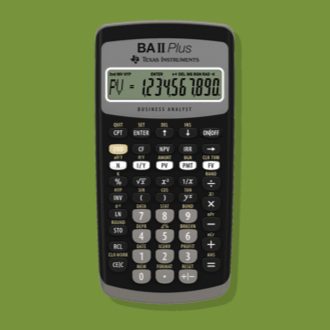
BA II Plus is affordable, easy to use, and the most widely-used calculator in CFA, FRM and CAIA exams.
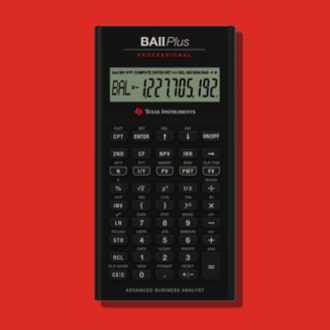
BA II Plus Professional is more premium, expensive yet easy to use. Has additional functions e.g. NFV, PB, DPB.
Unless you’re already a fan of the HP 12C, most people – including ourselves – would recommend Texas Instruments BA II Plus.
I owned and used a TI BA II Plus for my CFA exams and it served me very well.
BA II Plus pros
- Easy to learn and use
- Many third-party provider materials support the BA II Plus with step-by-step guides to calculation
- Cheaper than the HP 12C
BA II Plus cons
- The main complaint from candidates is that it looks cheap and plasticky.
- If you agree you can always get the BA II Plus Professional (sleeker looking, although Sophie has her gripes with the BA II Plus Professional version’s button sensitivity which may slow you down or worse, make mistakes…)
If you’re using the BA II Plus or BA II Plus Professional, check out our ultimate guide for additional tips and tricks:
HP 12C: Sleek and prestigious, but be aware of the RPN
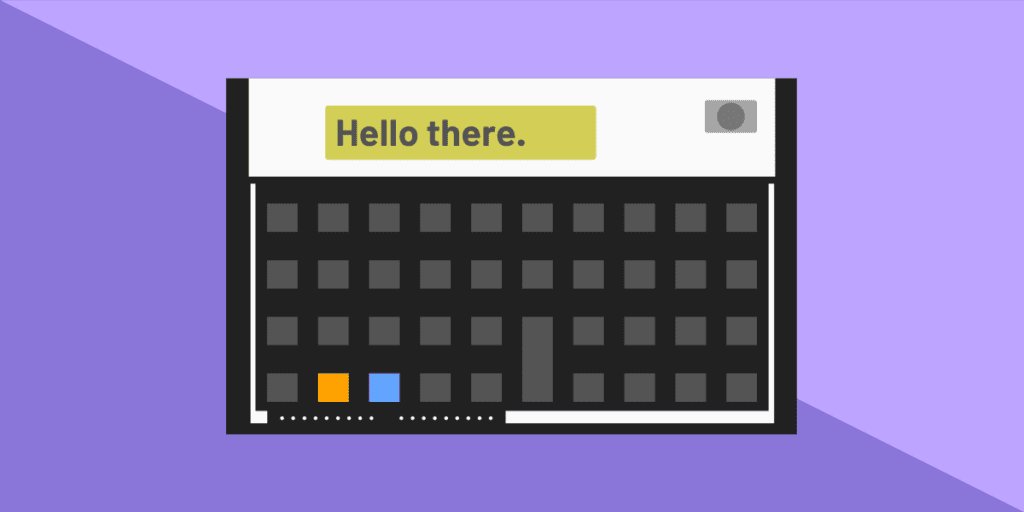
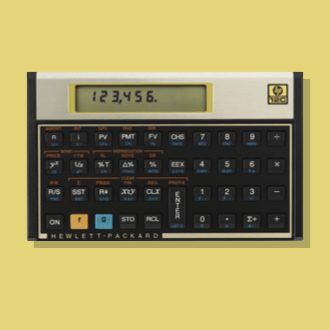
HP’s best selling financial calculator with over 120 built-in functions
Uses Reverse Polish Notation logic
The HP 12C was first introduced in 1981 and little has changed in terms of design and functionality since. The HP 12C has been given out to newcomers in banks for years – as a result it is the de facto standard of finance professionals. As a result there is a fiercely loyal group of HP 12C supporters who will always vouch for its superiority over the BA II Plus.
However, it uses a different input convention to most modern calculators called a Reverse Polish Notation (RPN), which can be perplexing if you’re new to the concept.
In Reverse Polish notation the operators follow their operands; for instance, to add 3 and 4, one would write “3 4 +” rather than “3 + 4”. You can try out a web version of how the RPN works on the HP 12C to get a feel of it.
HP 12C Pros
- (Perceived) prestige – this is the ‘old-school’ calculator
- If you’re used to RPN, we definitely recommend the HP 12C – chances are you’ll have one already!
HP 12C Cons
- If you’re NOT used to RPN, you’ll have to endure a learning curve before you can master the HP 12C, although many of the HP 12C’s fans maintain that it’s worth it.
- It’s more expensive. A side effect of its cult status among bankers is that it can cost 2-3x the price of a BA II Plus calculator.
- It’s not as widely used by CFA candidates. Study group discussions may go better if you are all working from the same calculator. Also, should you forget your calculator and borrow one, you’re probably going to end up with a BA II Plus loaner, so it might be better to get used to the BA II Plus.
If you’re new to the HP 12C, here’s a quick-start guide:
Our recommend CFA exam calculator
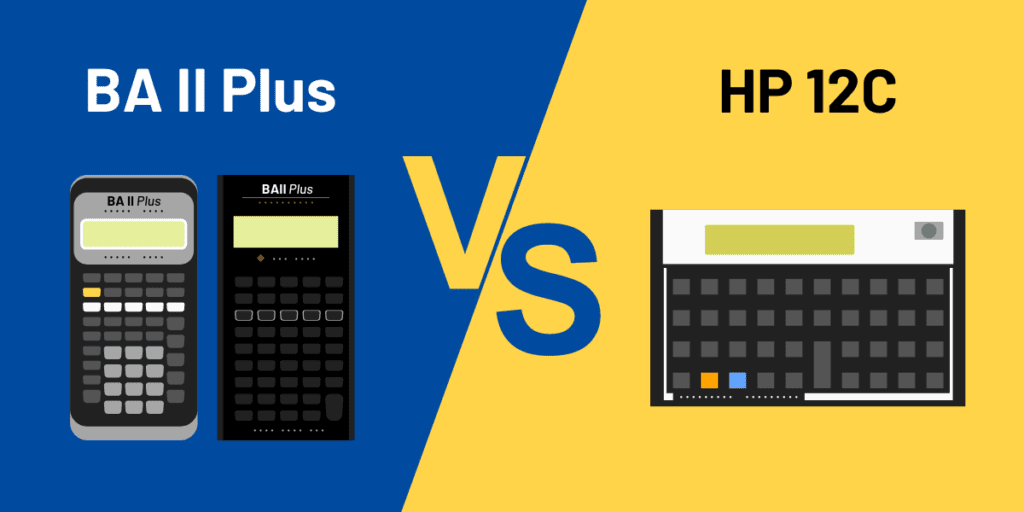
We would recommend the BA II Plus for value: that’s also the calculator to get if you’re looking to go with ‘what’s everyone else getting’.
But if you’re looking for a little bit of financial pizzazz, and all your bosses and colleagues are rocking the HP 12C, get that instead but consider the learning curve for the RPN.
Don’t worry about one being slower than the other – the key presses required for typical CFA questions and processing times are close enough to be irrelevant.
Are you on the fence, or have you picked a side? Let us know why in the comments below!
Meanwhile, here are other related articles which may be of interest:
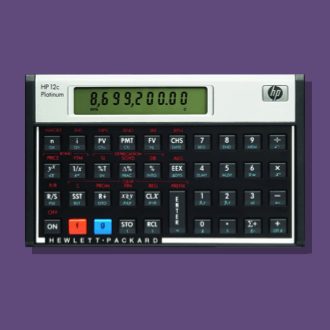

to enter 2 + 3 you have to enter 2 Enter 3 Enter + Equal. I can never get used that format ! stick to TE
you only need to enter:
2, enter, 3, +
That’s all. There is no = button
I own both 12c platinum and BA II+ pro, I’ve never used the BA, used to use the HP12c a lot years ago. Am still familiar with the 12c. When studying level II would it be worth my time to try and use BA or should I stick with the familiar 12c and save the learning curve for more level 2 work? I think i’d just use 12c but are there any reasons I’d want to switch?
thanks
Ah it’s a hard one JSwiz28!
If you’re familiar with HP12c, I would recommend sticking to it. There’s no best answer as we know people using and loving HP12c and claiming it’s faster, so it’s about the initial learning curve I suppose. I wouldn’t relearn BAII Plus for Level 2 and waste precious time personally on this, as you need speed, accuracy and time for L2!
Am i allowed to use the Texas Instruments BA II Plus Business Analyst calculator and is it a better suit for CFA L1?
Hi S, yes BA II plus works fine for CFA L1 – we compare that vs the Pro version in this article. I personally prefer the simpler BA II Plus (not the pro, or Advanced Business Analyst version). Hope this helps!
I downloaded app versions of both calculators and they are both hard for me to use. As a person who is used to Casio fx, these calculators are new to me. Which should I use? BA II Plus or HP 12c Platinum?
Hi Mike, there’s a slight learning curve which you’ll learn as part of your studies and doing practice questions. BA II Plus is by far the most popular one (with the most help/resources), although people who enjoy the RPN setup in HP12c platinum swear by it.
There is a misconception that HP23 C uses only RPN, it also arithmetic logic which is 4+3=7 so no need of RPNx I own HP12C Platinum, BAII and BAII professional, chances of error in BAII plus is more because of their key issues which you won’t find in HP12C.
Am I allowed to use “HP 10bII+” ?
No sorry, this is not part of the CFA exam approved calculators. Only Texas Instruments BA II Plus (including professional) and HP12C (including the HP 12C Platinum, 12C Platinum 25th anniversary edition, 12C 30th anniversary edition, and HP 12C Prestige) are allowed.
I’ve switched to using the HP 12c Platinum Caculator half way through my studies. I have simply had enough of the BA II Plus, it is awful and unreliable in my view. For me it’s just too risky to use during the exam when every second counts. I often find that my number entries have’nt actually registered even though I have clearly pressed the buttons. A problem I don’t have with the HP.
HP 12c Platinum all the way! Far more reliable , better build quality and worth the investment.
hallo, can I use TI-30Xa?
Hi Ludwig, I’m assuming you’re talking about CFA exams. If so, no, TI-30Xa is not a CFA exam approved calculator.
If you struggle with using the HP-12c, you’re never going to pass the exam anyway…
We all gotta start somewhere, don’t we?
Learning a new way of calculator has absolutely nothing to do with your knowledge of Economics and Finance. Stop the entitlement.
If you really think that everyone who passes cfa level 1 knows how to use HP-12c, you probably won’t make a very good money manager with such drastic and wrong assumptions, sorry.
Hey Sam..! Don’t take Paris comment so seriously. I’m sure is a joke. Why I know that? Because I am an HP fan too…!
Am I allowed to use CASIO CLASSWIZ CALCULATOR?
Hi Ayesha, no, that is not part of the CFA exam’s approved calculator list.
HP 12c Platinum. No doubt
BA II Plus Professional! Not only does it look and feel sturdier than the basic model, it also includes more functions, such as discounted payback, which are not included on the cheaper version. In an exam where every mark counts, why wouldn’t you pay slightly more to increase your chances if these type of questions come up (which at level 1 they undoubtedly will!).